Book Digest: March 26, 2007
It has not escaped my attention that some of my literary comrades have mellowed their negative attitudes toward the New York Times Book Review. I wonder if I will ever be able to say the same. I go through phases of paying attention to book reviews, and this is a time when I am. I recently had occasion to chat up Lionel Shriver again, who has just come out with a splendid new novel, The Post-Birthday World. Thus, I scanned a few reviews in the major dailies and even the occasionally (to me) repugnant NYTBR. The so-called review of Shriver’s book I found there reminded me of what I find odious in the Times’s review sensibility. Take the next-to-last sentence, for example: “But she seems to have rushed out this new book, churning through tired themes of infidelity and regret without offering fresh insight or even an entertaining story.” What is the basis for asserting the book was rushed out? Shriver’s last book, We Need to Talk About Kevin, was published in 2003. And then there is this last scribble: “The Post-Birthday World will only leave readers feeling snookered.” Since one of the main characters is a snooker champion, I could not help but have the feeling that the writer wrote her piece around this very lame—and I am told, her mistaken grasp of the meaning of “to be snookered.” Shame, shame, shame.
A few weeks ago, during the annual Academy Awards frenzy, I was thinking about great movie and novel match-ups—worthwhile movies that had decent texts as their starting points. Which led me to think about some of the books I would like to see turned into movies. That’s a list I will expose some other time—when I have run out of really interesting things to write about—but in the meantime news has filtered out that the BBC is going to produce a movie based on one of the great overlooked novels of twentieth-century America, namely Richard Yates’s Revolutionary Road. And what makes this project likely to see the light of day (you know how these things work, right?) is its proposed stars: Leonard DiCaprio and Kate Winslet.
Edward Hopper: An Intimate Biography by Gail Levin
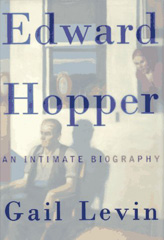
Pound for pound, there was not a more American painter than Edward Hopper. You can take your Wyeths, Sargeants, Homers, and Whistlers, but for my money Hopper is the man. These other guys made interesting, lovely, and sometimes haunting paintings, but for me, Hopper’s images of America are resonant renderings of America. Professor Gail Levin, who is a well-regarded curator and Hopper scholar (Edward Hopper: A Catalogue Raisonné, and The Poetry of Solitude: A Tribute to Edward Hopper) has updated her much-lauded 1995 biography with ruminations on Hopper’s influence on contemporary culture, and makes use of his wife Josephine Nivision’s diaries.
Luckily, I live in an area that will host a new Hopper exhibition (Boston’s Museum of Fine Arts, May 6-August 19, 2007), and I will no doubt be mentioning the exhibition catalogue in the coming month.
A Miracle of Catfish by Larry Brown
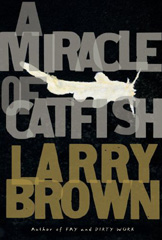
Larry Brown, born in Lafayette County, Miss. (yup, that makes him a Southern writer), has a life story as interesting as the ones he concocts. Though he was a captain in the Oxford, Miss., Fire Department, by the time he was 30 he had taken up writing (mostly) fiction, and published a story collection in 1988. When he suddenly died of a heart attack in 2004, at the age of 53, he had five wonderful novels to his credit. A Miracle of Catfish, his sixth, was well underway, and had been sent, nearly complete, to his literary agent. Set close to Brown’s home in Mississippi, it recounts a year in the life of four men, a boy, and at least one catfish. If you don’t know Brown’s writing, this is would be a good time to get with it. Additionally, Arliss Howard did a splendid job of adapting some of Brown’s autobiographical stories to film in Big Bad Love.
Mishima’s Sword: Travels in Search of a Samurai Legend by Christopher Ross
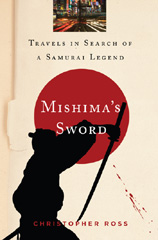
Christopher Ross (Tunnel Visions: Journeys of an Underground Philosopher), a writer living in Paris, claims to have traveled to more than 100 countries—which I would think is worthy of a book, yes? At any rate, his new opus is a splendid piece of work connected to the legendary Japanese writer, who in 1970, after a failed coup attempt, dramatically committed seppuku, which included being beheaded with his own antique sword by one of his co-conspirators. Ross, who spent five years in Japan, bases this story on his hunt for that sword—which not surprisingly puts him in contact with a wholly unanticipated world and an invisible culture. Paul Schrader tried to illuminate the Mishima narrative back in 1985, and it may also be worth reviewing that effort. Well, I will anyway.
Charisma: The Gift of Grace and How it Has Been Taken Away From Us by Philip Rieff
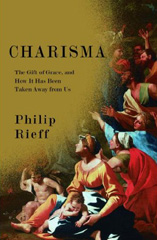
Philip Rieff, who taught at some of this country’s most prestigious universities, and who died in July 2006, was a member of that group of Americans I call the “intellectual mandarin class.” Not to be confused with the smirking toadies, who are (I won’t name names here, mostly because my editors are too polite to allow me to slander anyone) apologists and popularizers for the reigning order. In this instance, former students Dan Frank and Aaron Manson encouraged Rieff to complete a project he had first conceived of 35 years ago: namely, an exploration of the concept of charisma within our Western culture and its evolution—especially Max Weber’s stripping it of any moral valence.
» Read an excerpt from Charisma
The Book of Air and Shadows by Michael Gruber
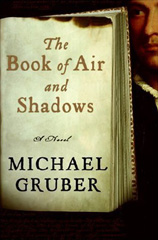
After a successful skein of ghost-writing bestsellers for Robert K. Tanenbaum, Michael Gruber, who has also been a marine biologist and a speechwriter for Jimmy Carter, has written three riveting and intelligent novels (Tropic of Night, Valley of Bones, and Night of the Jaguar) that have a Cuban-American homicide detective at their center. He has also written a wonderfully imagined children’s fable, The Witch’s Boy—my son Cuba is a fan. Now he brings us the story of Jake Mishkin, an intellectual property lawyer who becomes embroiled in a conspiracy involving a writer named William Shakespeare—thus giving the erudite Gruber the pretext for recreating the Bard’s life as well as delivering another one of his own patently intricate thrillers.
It Can Happen Here: Authoritarian Peril in the Age of Bush by Joe Conason
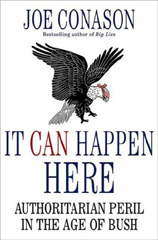
Joe Conason—whose gadfly credentials are impeccable—cites Sinclair Lewis’s It Can’t Happen Here, written in 1935: “When fascism comes to America, it will be wrapped in the flag, carrying a cross.” I make these references to point out that paranoia about an impending fascist putsch is in fact a reasonable mainstream preoccupation. Michael Tomasky, who once edited The American Spectator, suggests: “When Joe casts his eye on the cadres of the right, they invariably emerge battered, with their arguments filleted, their sources of money exposed, and their real motives laid bare.”
Conason takes up the dark, frightening question of the life expectancy of American democracy in the context of the prevalence of the anti-democratic forces of the Christian Right and Really Big Business. If you need a taste of Conason’s point of view, he writes for Salon, and has written a popular political column for The New York Observer since 1992. If you believe in democracy and the will and value of the people and other humanist notions, be afraid. Be very afraid.
Almost Human: Making Robots Think by Lee Gutkind
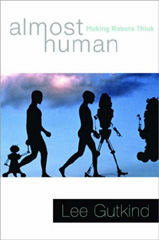
Lee Gutkind is well-known for his zealous participation in the creative nonfiction movement, editing Creative Nonfiction, the first literary journal to publish nonfiction exclusively, and teaching the University of Pittsburgh. He has taken up the fascinating and hidden-in-plain-sight subculture of robotics, of which Carnegie Mellon University’s Robotics Institute in Pittsburgh is an epicenter. It’s home to Hyperion, which/who traversed the Antarctic, and Zoe, the world’s first robot scientist, and where Segways learn to play soccer. It’s an amazing world, and Gutkind’s nimble grasp of it makes for a good story well told.
The Cigarette Century: The Rise and Fall and Deadly Persistence of the Product That Defined America by Allan M. Brandt
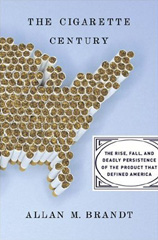
Here are two things to chew on from The Cigarette Century, the magnum opus on which Harvard University medical historian Allan Brandt spent 25 years:
Although smoking has declined significantly in the U.S. and other western nations, more people around the globe smoke cigarettes than ever before. As a result, the coming century is poised for an unprecedented pandemic of tobacco-related disease. And the World Health Organization now predicts 1 billion deaths over the next hundred years; 10 times as many as died in the 20th century.
What are the chances of that, do you think?
» Read an excerpt from The Cigarette Century
Don’t Go Where I Can’t Follow by Anders Nilsen
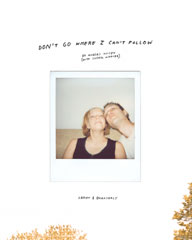
I am a fan of these quasi-hybrid chapbook-journals—the last one I remember being published was Dan Elder’s by Chronicle books—which is to say it takes a special kind of book publisher to see the value. In this instance, Anders Nilsen collected a variety of letters, drawings, and photographs to pay homage to his lover, Cheryl Weaver, who died of cancer in 2005. As Nilsen recognizes, “This story is, obviously, very personal, but ultimately I think it isn’t exclusive. It feels incredibly particular to me, still, but it’s just love and loss. And everyone, for better or worse, can relate to that.”
» Read an excerpt [PDF] from Don’t Go Where I Can’t Follow
East Fifth Bliss by Douglas Light
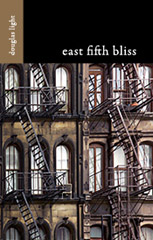
I was thinking about the chances of Douglas Light having this book reviewed, as it is—to his credit—self-published. My guess is: almost zero chance. Anyway Light, who grew up in Indiana, has been published variously at the New York Times, Identity Theory, Alaska Quarterly Review, failbetter, Pindeldyboz, and The Morning News. He has won an O. Henry Award, and was selected for Dave Eggers’s quirky anthology, Best American Nonrequired Reading 2003.
» Read an excerpt from East Fifth Bliss
You Don’t Love Me Yet by Jonathan Lethem
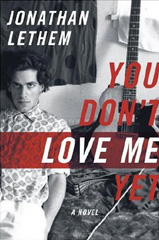
Jonathan Lethem joins the increasingly less-select group of writers (Elmore Leonard, Michael Gruber, Joyce Carol Oates, Jim Crace, Martin Amis, Richard Ford, McGuane and Harrison, Jim Shepard, Amy Blum and Andrea Barrett, George Pelacanos, et al.) whose books I feel required to read. He has an original and restless sensibility, and having come upon his work in the last millennium, I have felt rewarded by my attention to his writing, both fiction and non-. I must admit I found Fortress of Solitude to be the most affecting, reverberating, and ultimately most enjoyable of his books—this, his new one, could not have a less promising and attractive premise: a send-up of the alternative band scene in the city of Los Angeles. But, as they say in sports, “That’s why we play ‘em.” Additionally, Lethem has done a clever and trailblazing thing, I think, to which I direct you by going here and here.
» Read an excerpt from You Don’t Love Me Yet
